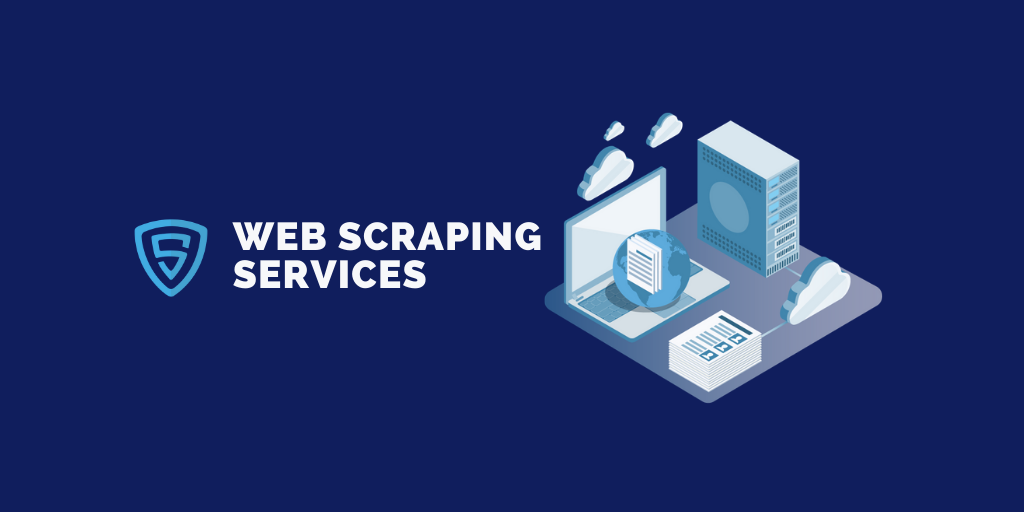Web scraping, also known as web data extraction or web data harvesting, is the extraction of various datasets from one or more websites per a user’s or company’s needs. Usually, this name is given to the automated process of data extraction, although it can still be used when referring to the manual act of collecting data by humans. However, web scraping is rarely used in the context of manual work. In this regard, it involves the use of software or applications.
These applications are made up of two fundamental components – a crawler/spider and a scraper. The former scours the internet looking for websites that contain the information featured in the instructions that a user issues. Once the crawler finds the websites, it notes them down in a process called indexing before passing them over to the scraper.
The scraper then requests HTML documents from a web server. An HTML document is the HTML version of a webpage. Once the web server sends the required content, the scraper analyzes the document using data locators, which show the sections where the data is stored. The scraper then extracts it and converts it into a structured format that is availed to the user for viewing or analysis.
Types of web scraping tools
Web data harvesting is carried out by two types of tools:
- Ready-to-use applications
- In-house web scrapers
Ready-to-use applications
As the name suggests, this type of web scraper is available for use as is; that is, you do not need technical knowledge to operate it or tweak the code. All you have to do is input instructions in the form of the websites you want this tool to access and the data locators to use. The application will then do the rest. Upon extracting the information, it will convert it to a structured format and avail it to you for download as a spreadsheet or .csv file.
In-house web scrapers
In-house web scrapers are created from scratch using Python. This implies that if you are to develop such a product, you must have a solid grasp of this programming language. In the event that you run a company, having a dedicated team of developers is your best bet if you are to achieve any success with creating and using in-house web scrapers. If you lack the technical know-how, you have to hire developers, meaning that this type of web scraper is more expensive than the ready-to-use applications.
Nonetheless, both types of web scrapers can be deployed in large-scale data extraction exercises. All you need in either case is to use the web scraping tool alongside a rotating proxy server. This proxy changes the assigned IP address after a few minutes, thereby ensuring that a single IP address is used to make only a few web requests. Alternatively, some rotating proxies assign each web request a unique IP address. Proxy servers help prevent IP blocking, a common anti-scraping technique.
While the effectiveness of combining proxies and web scraping tools cannot be disputed presently, the future holds possibilities that will lower this effectiveness. As it stands, the internet is a trove of information. But this volume is expected to increase, eventually complicating the process of data collection.
Currently, automated web scraping requires a human being’s input, for instance, in proxy management, issuing instructions, and analyzing the data. This slows down the process, not to mention that it is a tedious exercise for the people involved, who are also likely to make a few errors.
AI web scraping
These reasons underscore the need for full automation, which is what AI web scraping will achieve. AI automates both simple and complex tasks, i.e., proxy management, data parsing, data collection, analysis, and visualization. AI web scraping is a promising reality, considering the projected growth in the data available online and the fact that AI technology has significantly improved. In fact, AI is already being used by sales and marketing departments to extract data that provides insight into the consumer market. If you are interested in AI web scraping technologies, click to learn more.
AI web scraping provides the following benefits:
- It collects more data
- It increases the accuracy of data collection
- It is a high-speed method that saves time
Pros and cons of web scraping
Notably, automated web scraping has several advantages as well as disadvantages.
Pros of web scraping
- Provides automation
- Provides access to insights and the capability to collect business intelligence
- Offers access to a variety of datasets
- Enables data management by structuring the collected data
Cons of web scraping
- Anti-scraping tools put in place to stop any data extraction
- To create an in-house web scraper, you need to have a technical background
- Websites regularly alter their HTML structure, which makes web scraping a challenge
- Web crawlers require routine maintenance to keep them operational and up-to-date
These advantages do not take away the fact that web scraping provides access to data that helps companies grow their operations. That said, AI web scraping is likely to eliminate some of these disadvantages.

